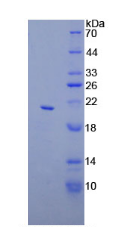Active Apolipoprotein C3 (APOC3)
Apo-C3; APOCIII; APOC-III
- Product No.APB890Mu01
- Organism SpeciesMus musculus (Mouse) Same name, Different species.
- Buffer Formulation20mM Tris, 150mM NaCl, pH8.0, containing 1mM EDTA, 1mM DTT, 0.01% SKL, 5% Trehalose and Proclin300.
- Traits Freeze-dried powder
- Purity> 95%
- Isoelectric Point5.1
- ApplicationsCell culture; Activity Assays.
- DownloadInstruction Manual
- UOM 10µg50µg 200µg 1mg 5mg
- FOB
US$ 324
US$ 810
US$ 1620
US$ 4860
US$ 12150
For more details, please contact local distributors!
ACTIVITY TEST

Figure. The binding activity of APOC3 with PCYOX1.
Apolipoprotein C3 (APOC3) also known as apo-CIII is a component of very low density lipoprotein (VLDL). APOC3 inhibits lipoprotein lipase and hepatic lipase; it is thought to inhibit hepatic uptake of triglyceride-rich particles. An increase in apoC-III levels induces the development of hypertriglyceridemia. Some evidences suggest an intracellular role for Apo-CIII in promoting the assembly and secretion of triglyceride-rich VLDL particles from hepatic cells under lipid-rich conditions. Besides, Prenylcysteine Oxidase 1 (PCYOX1) has been identified as an interactor of APOC3, thus a binding ELISA assay was conducted to detect the interaction of recombinant mouse APOC3 and recombinant mouse PCYOX1. Briefly, APOC3 were diluted serially in PBS, with 0.01% BSA (pH 7.4). Duplicate samples of 100μL were then transferred to PCYOX1-coated microtiter wells and incubated for 2h at 37℃. Wells were washed with PBST and incubated for 1h with anti-APOC3 pAb, then aspirated and washed 3 times. After incubation with HRP labelled secondary antibody, wells were aspirated and washed 3 times. With the addition of substrate solution, wells were incubated 15-25 minutes at 37℃. Finally, add 50µL stop solution to the wells and read at 450nm immediately. The binding activity of APOC3 and PCYOX1 was shown in Figure 1, and this effect was in a dose dependent manner.
USAGE
Reconstitute in 20mM Tris, 150mM NaCl (pH8.0) to a concentration of 0.1-1.0 mg/mL. Do not vortex.
STORAGE
Avoid repeated freeze/thaw cycles. Store at 2-8°C for one month. Aliquot and store at -80°C for 12 months.
STABILITY
The thermal stability is described by the loss rate. The loss rate was determined by accelerated thermal degradation test, that is, incubate the protein at 37°C for 48h, and no obvious degradation and precipitation were observed. The loss rate is less than 5% within the expiration date under appropriate storage condition.
GIVEAWAYS
INCREMENT SERVICES
-
 BCA Protein Quantification Kit
BCA Protein Quantification Kit
-
 Molecular Mass Marker for Protein
Molecular Mass Marker for Protein
-
 Monoclonal Antibody Customized Service
Monoclonal Antibody Customized Service
-
 Polyclonal Antibody Customized Service
Polyclonal Antibody Customized Service
-
 Protein Activity Test Experiment Service
Protein Activity Test Experiment Service
-
 Electrophoretic Mobility Shift Assay (EMSA) Experiment Service
Electrophoretic Mobility Shift Assay (EMSA) Experiment Service
-
 Buffer
Buffer
-
 Lentivirus Packaging Experiment Service
Lentivirus Packaging Experiment Service
-
 Adenovirus Packaging Experiment Service
Adenovirus Packaging Experiment Service
-
 Real Time PCR Experimental Service
Real Time PCR Experimental Service
-
 Spike RBD Protein (S-RBD)
Spike RBD Protein (S-RBD)
-
 Protein G
Protein G
-
 Protein A
Protein A
| Magazine | Citations |
| Atherosclerosis | Up-reCavia (Guinea pig )lation of Hnf1α gene expression in the liver of rats with experimentally induced chronic renal failure – A possible link between circulating PCSK9 and triacylglycerol concentrations Pubmed:26978583 |
| The Journal of Lipid Research | Effects of angiopoietin-like protein 3 deficiency on postprandial lipid and lipoprotein metabolism Pubmed:27040449 |
| Journal of Chromatography A | Application of a new procedure for liquid chromatography/mass spectrometry profiling of plasma amino acid-related metabolites and untargeted shotgun proteomics to identify mechanisms and biomarkers of calcific aortic stenosis S0021967317311858 |
| J Transl Med | Multi-omic signatures of atherogenic dyslipidaemia: pre-clinical target identification and validation in humans 33407555 |
| Catalog No. | Related products for research use of Mus musculus (Mouse) Organism species | Applications (RESEARCH USE ONLY!) |
| APB890Mu01 | Active Apolipoprotein C3 (APOC3) | Cell culture; Activity Assays. |
| RPB890Mu01 | Recombinant Apolipoprotein C3 (APOC3) | Positive Control; Immunogen; SDS-PAGE; WB. |
| RPB890Mu02 | Recombinant Apolipoprotein C3 (APOC3) | Positive Control; Immunogen; SDS-PAGE; WB. |
| PAB890Mu02 | Polyclonal Antibody to Apolipoprotein C3 (APOC3) | WB; IHC; ICC; IP. |
| PAB890Mu01 | Polyclonal Antibody to Apolipoprotein C3 (APOC3) | WB |
| MAB890Mu21 | Monoclonal Antibody to Apolipoprotein C3 (APOC3) | IHC |
| SEB890Mu | ELISA Kit for Apolipoprotein C3 (APOC3) | Enzyme-linked immunosorbent assay for Antigen Detection. |
| LMB890Mu | Multiplex Assay Kit for Apolipoprotein C3 (APOC3) ,etc. by FLIA (Flow Luminescence Immunoassay) | FLIA Kit for Antigen Detection. |
| KSB890Mu01 | ELISA Kit DIY Materials for Apolipoprotein C3 (APOC3) | Main materials for "Do It (ELISA Kit) Yourself". |









